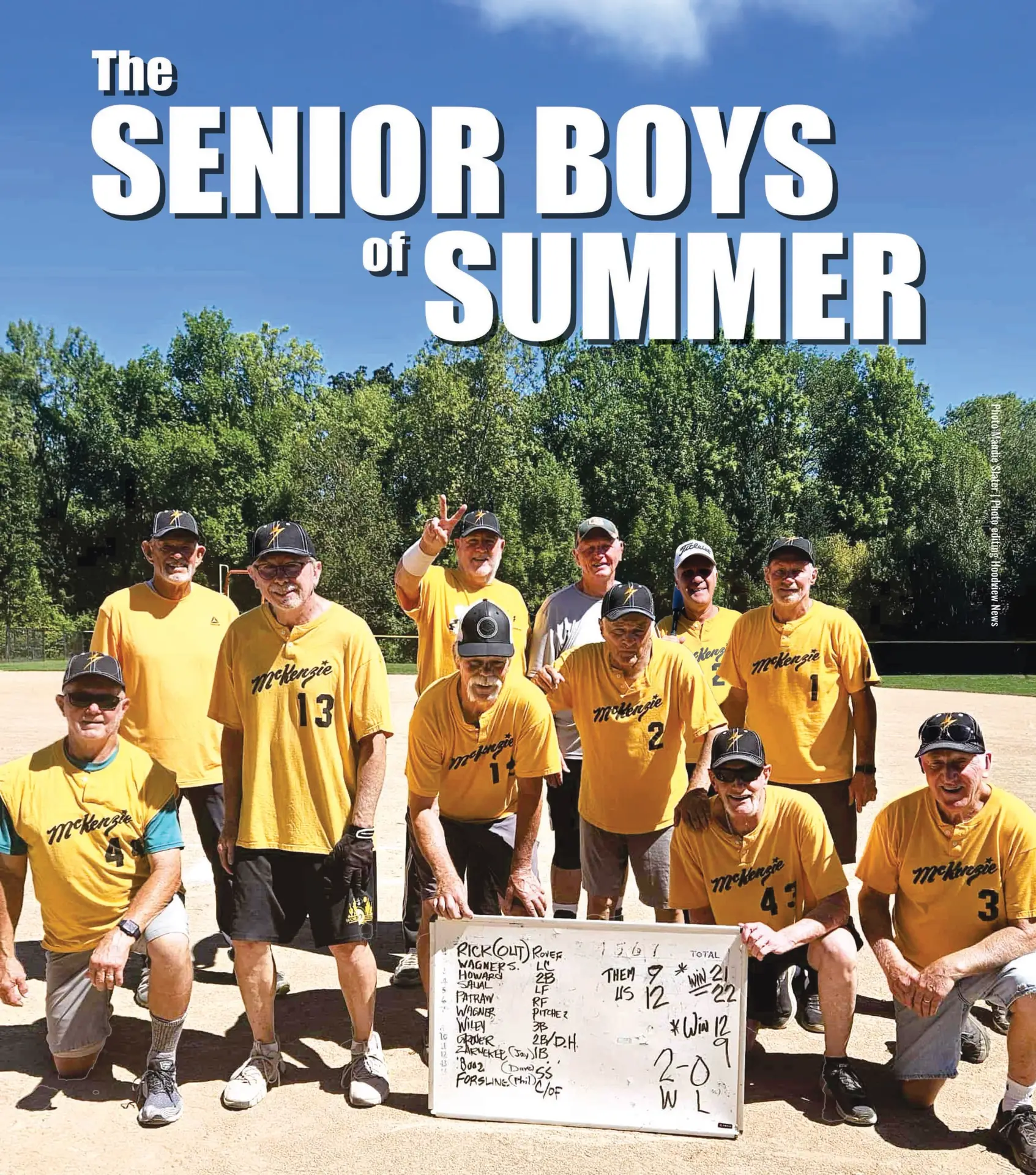By MIKE WILEY
Publisher
“The Boys of Summer” is the title of Roger Kahn’s 1972 book on the Brooklyn Dodgers. Centered around the 1953 Dodgers — a team that included Jackie Robinson, Duke Snider, Don Newcombe, Pee Wee Reese, and Roy Campanella — the book has long been regarded as one of the classic sports memoirs. In the first part, Kahn recounted how the Dodgers became the heartbeat of Brooklyn, playing in the cramped yet intimate Ebbets Field. In the second part, written in the later 1960s, he revisited those same players, now retired and grappling with life beyond baseball. What emerged was not just a chronicle of games won and lost, but a meditation on youth, time, and the enduring pull of the sport.
More than fifty years after Kahn’s book was published, in a different corner of America, a new generation of “boys of summer” takes the field. They do not play before 30,000 fans in Brooklyn, nor do they ride the rails of the old National League. Their stadiums are the well-kept diamonds at North Clackamas Park and Delta Park, and their league is the Portland Area Senior Softball League, better known as PASS. Their uniforms may be sponsored by small local businesses instead of major league owners, but the devotion is the same. They lace up their cleats each week, many in their sixties, seventies, some in their eighties, carrying forward the simple joy of the game.
Like Kahn’s Dodgers, they, too, have their cast of characters — managers who strategize lineups, sluggers who can still drive the ball over the fence, and veterans who play more for camaraderie than for standings. They may be retired postal workers, electricians, business owners, or grandfathers, but on Mondays and Tuesdays, they are teammates. They are competitors. They are ballplayers. They are, in their own right, the senior boys of summer.
Early roots and new fields
The Portland Area Senior Softball League traces its roots back to the early 1990s. What began with just a handful of teams on scattered fields around the metro area has grown into a vibrant league that now fills out two modern complexes: North Clackamas Park in Clackamas and Delta Park in North Portland. Each week from April through October, the sound of balls smacking into modern gloves, the thwack of high-tech composite bats, and the good-natured ribbing of fellow players carry across the diamonds as more than a hundred players take their turn at the plate. The league is open to senior ladies of summer, too, and there are several excellent female players, but the majority of players in the senior leagues are of the male persuasion.
The league is organized into four divisions: two recreational, one competitive, and one “super senior” group for players 75 and older. On Mondays, the North Clackamas recreational division takes the field. Tuesdays belong to the Delta Park recreation teams. Wednesdays bring the competitive division back to North Clackamas. And Thursdays are reserved for the super seniors, 75+, at Delta Park, where those in their late seventies and eighties prove that age does not have to end an athlete’s story
Bill Tidd, the league’s overall administrator, says the purpose goes well beyond wins and losses. “The primary reason that most of us play softball is to stay off the couch, keep our bodies active,” Tidd explained. “It means camaraderie with my friends, a good outing outdoors for a day or two, and just the pure enjoyment of the game.” In a 2022 KGW interview, Tidd said, “To watch all these guys at the various age groups that will come out and play — there’s not a lot of animosity. They just enjoy the game.”
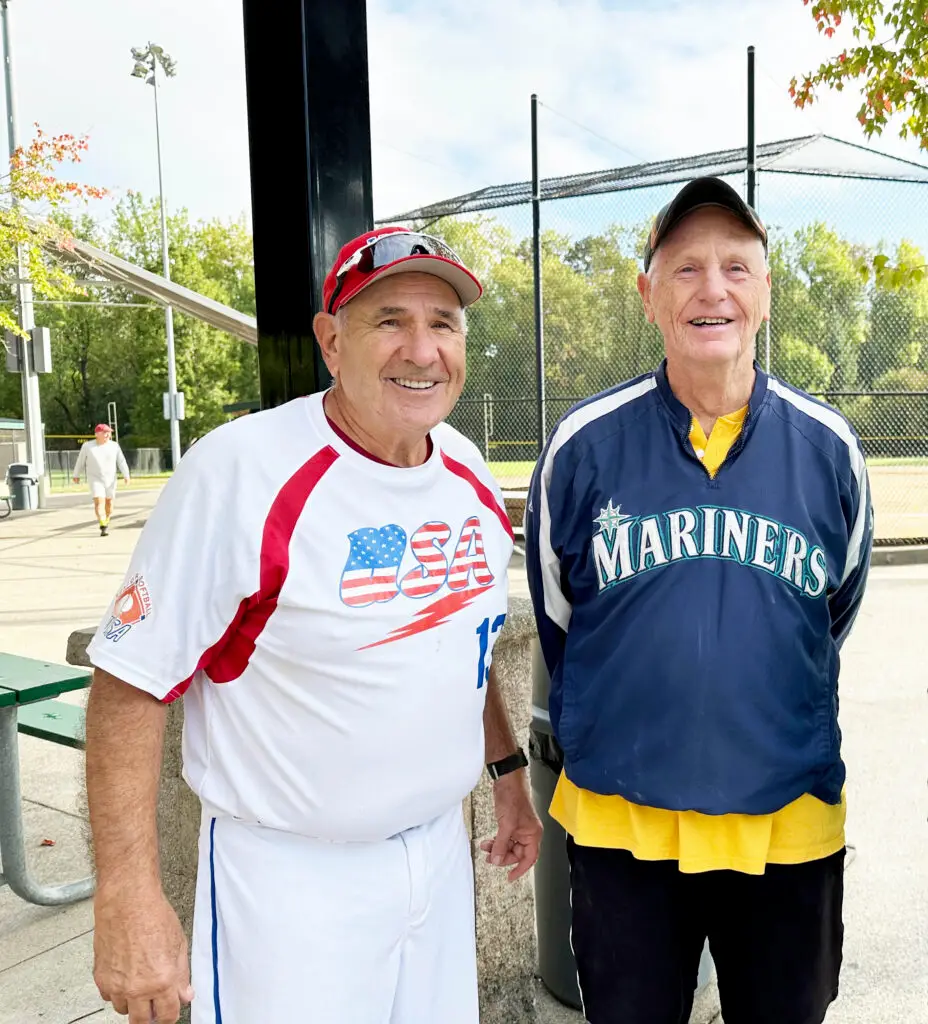
That sentiment is echoed by Tom Mayer, commissioner of the North Clackamas recreational division. Mayer, who still pitches and plays first base at age 72, says softball has given him a new lease on life. “Instead of being a fat ass on the couch, I’m a nice, producing citizen now,” he joked. “It keeps us young. I go into stores and see people my age in wheelchairs, and I think, ‘You should be out playing softball.’”
For Mayer, the game has also filled a social gap. “Since all our kids have grown up, I don’t have any friends anymore, except for my softball buddies,” he said. “We golf together once a week, too, a great bunch of guys.”
The games themselves reflect that spirit. Pitchers throw from behind protective screens. Courtesy runners are allowed for players who can still hit but no longer sprint. Teams umpire their own contests, relying on sportsmanship to carry the day. Yet anyone who watches quickly sees that the competitive fire still burns. Runs are tallied, fences are challenged, and doubleheaders are played with energy that belies the birth dates on driver’s licenses.
PASS is not an isolated phenomenon. It is part of a national movement that stretches from Florida to California, tied together by national umbrella organizations. These national organizations set the broad framework for the sport, from age brackets that stretch into the eighties to the special bats and balls designed to keep the game lively and safety standards to keep players safe. At the pinnacle are massive national tournaments, where senior teams compete for championships.
For Portland’s seniors, however, it doesn’t take a national title to feel the thrill. As both Tidd and Mayer emphasize, the league thrives because of love for the game, the friendships it sustains, and the volunteers who make it possible. That love has created a community where old friends reunite, new friendships are formed, and everyone has a reason to keep lacing up cleats year after year.
The “Dodgers” of Clackamas: McKenzie Electric
Jay Zarnekee, player/manager
Every league has its iconic teams, and in PASS one of those is the McKenzie Electric team. Sponsored by longtime local businessman Jay Zarnekee, the team has become known not just for its familiar mustard yellow jerseys and black hats with a lightning bolt, but for the sense of fraternity that defines it. Zarnekee, now 73, tall and strong in his later years, has been both player and manager, shaping rosters and leading McKenzie Electric through years of memorable seasons. This year, Zarnekee plays first base and organizes the team for each game — not always an easy task.
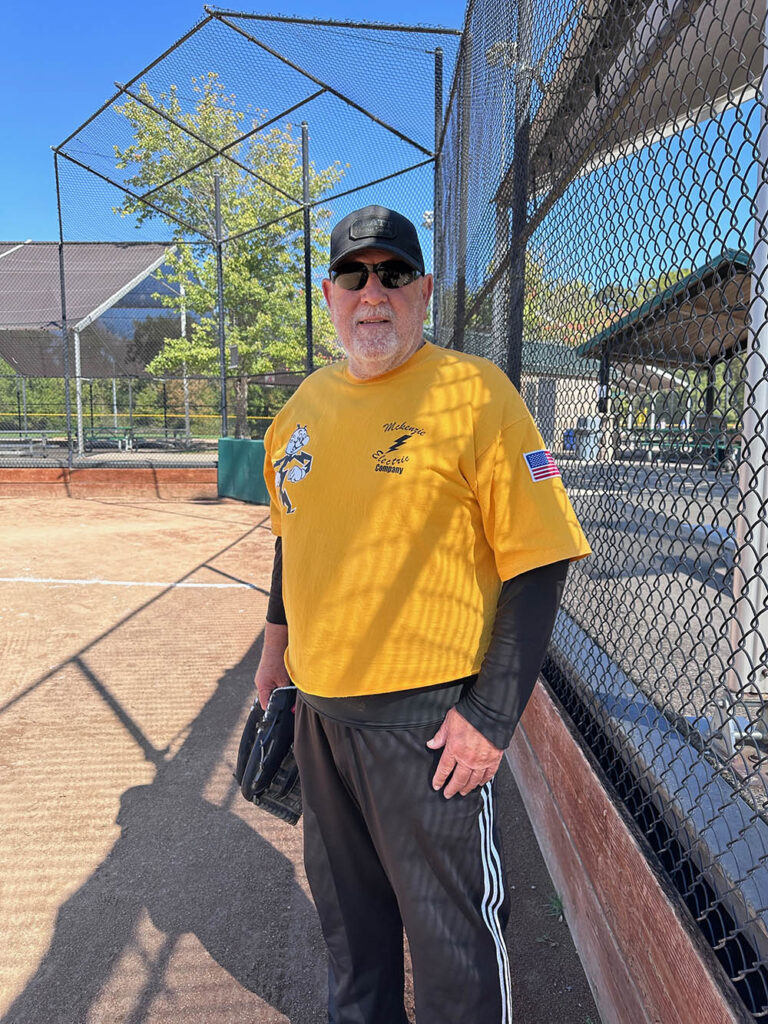
“I first got recruited watching a game up at Hoodview Park,” Zarnekee recalled. “Ron Barr, who was commissioner at the time, asked me to start playing on his team. That was in 2015. The next year I decided to put together McKenzie Electric. We won five championships in a row back when they kept track of win and loss records.”
While titles once brought bragging rights, the heart of the team has always been friendship. “First and foremost is the fraternity of friendships,” Zarnekee said. “For men, you know, that’s a great rule to socialize. I used to always want to win, and I don’t think there’s anything wrong with that. But this year I had to realize it’s not always about winning. It’s about being together, enjoying the game, and supporting each other.”
That philosophy has carried through the team’s lineup. McKenzie Electric’s roster blends veterans of championship runs with newcomers finding their way back to the game. Assistant manager Billy Kidd, 74, brings steadiness and experience. Players like Chuck Saul (75), Randy Wagner (70), Steve Wagner (74), Charlie Howard (74), Dave Boos (75), Phil Forsline (81), Jerry Grover (81), Jim Huber (72), Bobby Patraw (74), and John Tang (67) help fill out the roster. Each man carries his own story into the dugout. While a few others have played games for the team, these players have made up the core of the McKenzie Electric team this season.
Through the season, players also get to know the players on the other teams. Sometimes, players on opposite teams on Mondays, may be on the same team on Tuesday, Wednesday or Thursday. Zarnekee has seen it firsthand. “It doesn’t take very long,” he said. “You see somebody, recognize their face, and soon you’re calling them by name. Pretty soon you’re friends. I think that’s what it’s all about. If you asked most guys in the league, they enjoy playing because of the friendships. It’s good for everybody’s mental well-being.”
On Mondays at North Clackamas or Tuesdays at Delta Park, that bond is visible. Some players bring spouses and families to cheer. Others simply come for the chatter on the bench, the high fives after a hit, or the laughter that erupts when a pop fly drops between three fielders. When that happens, the laughing comment, “Well, that’s senior softball,” is often repeated on the bench. Wins are sweet, but the real prize is the team itself.
The Players
Chuck Saul, outfield, 75
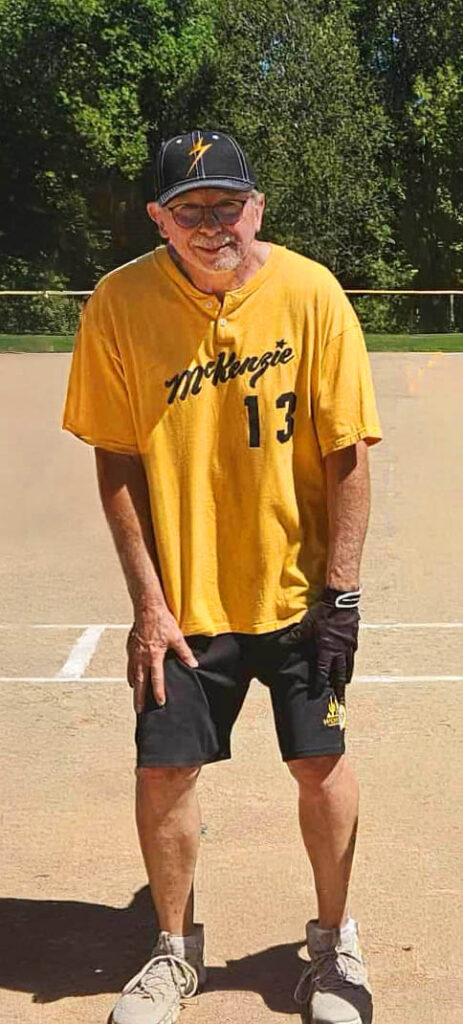
A baseball player from way back, Chuck Saul still carries the competitive fire that once put him in the Clackamas Community College Baseball Hall of Fame. “In 1969, my coach from Oregon City High School told me Clackamas was starting a baseball team. I got a scholarship, worked part-time for the road department, and went to school full-time,” Saul recalled. “We won the championship that first year, and they inducted our team into the Hall of Fame five years ago.”
These days, Saul says the game is as much about health as nostalgia. “At my age, they say it’s all about movement, body movement,” he said. “That’s why I play softball. It’s physical activity. I enjoy it. It brings back past memories. I’ve played on some incredible teams, won national and state championships, even world championships in baseball. I have three world championship rings, one MVP, one Golden Glove award.”
And make no mistake, Saul still plays hard. At 75, he is probably the best hitter on the team, regularly powering the ball over the fence. Recently, he showed his Clackamas Hall of Fame arm strength by throwing a runner out at home plate from the outfield — a throw many younger players would envy.
Dave Boos, shortstop, 75
For Dave Boos, senior softball was a reluctant yes that turned into a life-giving commitment. “A friend bugged me year after year to play. I was always too busy,” he said. “In 2018, I finally said yes. The last time I’d played was in 1982 for Good Shepherd’s softball team, right before my wife and I went into missions with Wycliffe Bible Translators.”
Since then, he’s never looked back. “I really enjoy it. It was fun to meet new guys, to stay active. I have no intention of quitting anytime soon.” Beyond the PASS season, Boos also plays on a traveling team once a month — proof that the game can still fill a calendar.
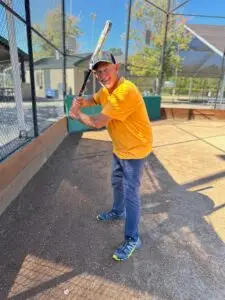
Boos is also McKenzie Electric’s shortstop, a demanding position at any age. At 75, he has made spectacular plays ranging from diving catches to key throws that save runs. His sure hands and quick reactions have helped anchored the team’s defense all season.
Dave “Viking” Thoreson, outfield, 75
Known to nearly everyone in the league as “Viking,” Dave Thoreson carries one of the most memorable nicknames in PASS. “When I first joined, I hit an inside-the-park home run. Our coach started calling me Thor, and Ron Barr said, ‘No, he’s a Viking.’ Ever since then, everyone’s called me ‘Viking’” Thoreson laughed.
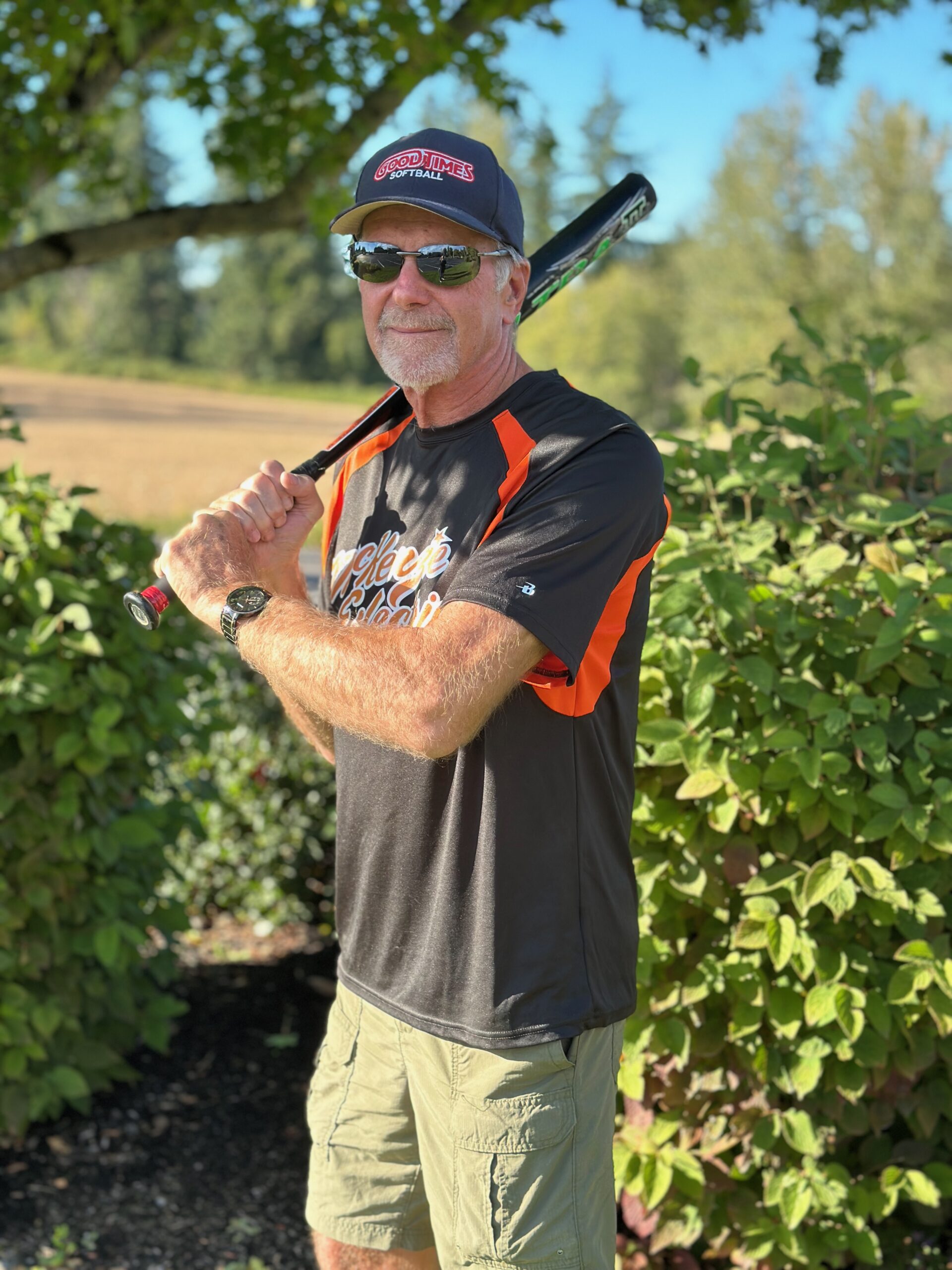
Fourteen years later, he’s still out there, usually in the outfield or pinch running for teammates. “Senior softball, it’s the camaraderie of the guys,” he said. “It’s the competition, the excitement. I love getting a hit, making a catch at a dead run, or knocking in the winning run for a walk-off. That’s always fun. The whole team comes out, gives you high fives, pats you on the back. It’s fun.”
Thoreson admits the game has been more than just exercise. “As we get older, more and more of my friends have died. That’s tough. But this league keeps me connected.”
This year, in the first game at Clackamas, in his first at bat, Thoreson badly tore the rotator cuff in his shoulder. He was told that surgery was possible, even likely, He thought he would be out for the season. He had to drop off the Clackamas roster, but kept playing on the Tuesday Delta Park Mckenzie Electric team. He couldn’t bat or play the field, but he is a fast runner and could pinch run for some of the other batters.
Through the season he battled back, going to physical therapy and doing exercises. He is now back hitting again, though not pushing it too hard.
Phil Forsline, outfield, 81
At 81, Phil Forsline is one of the oldest players in PASS, but his energy is unmistakable. “I’ve been playing baseball ever since I was five years old,” he said. “When I was in the military in San Antonio, I ran a 10 flat in the 100-yard dash. That was pretty darn fast. I can still run.” Even at 81, Forsline runs so well he often pinch-runs for other players. He has a knack for line drives that land in the perfect hit zone between the infielders and outfielders. He is a former fruit researcher for Cornell University in New York and is a big proponent to his teammates of tart cherry juice to combat inflammation. If Phil’s play is any indication, it works.
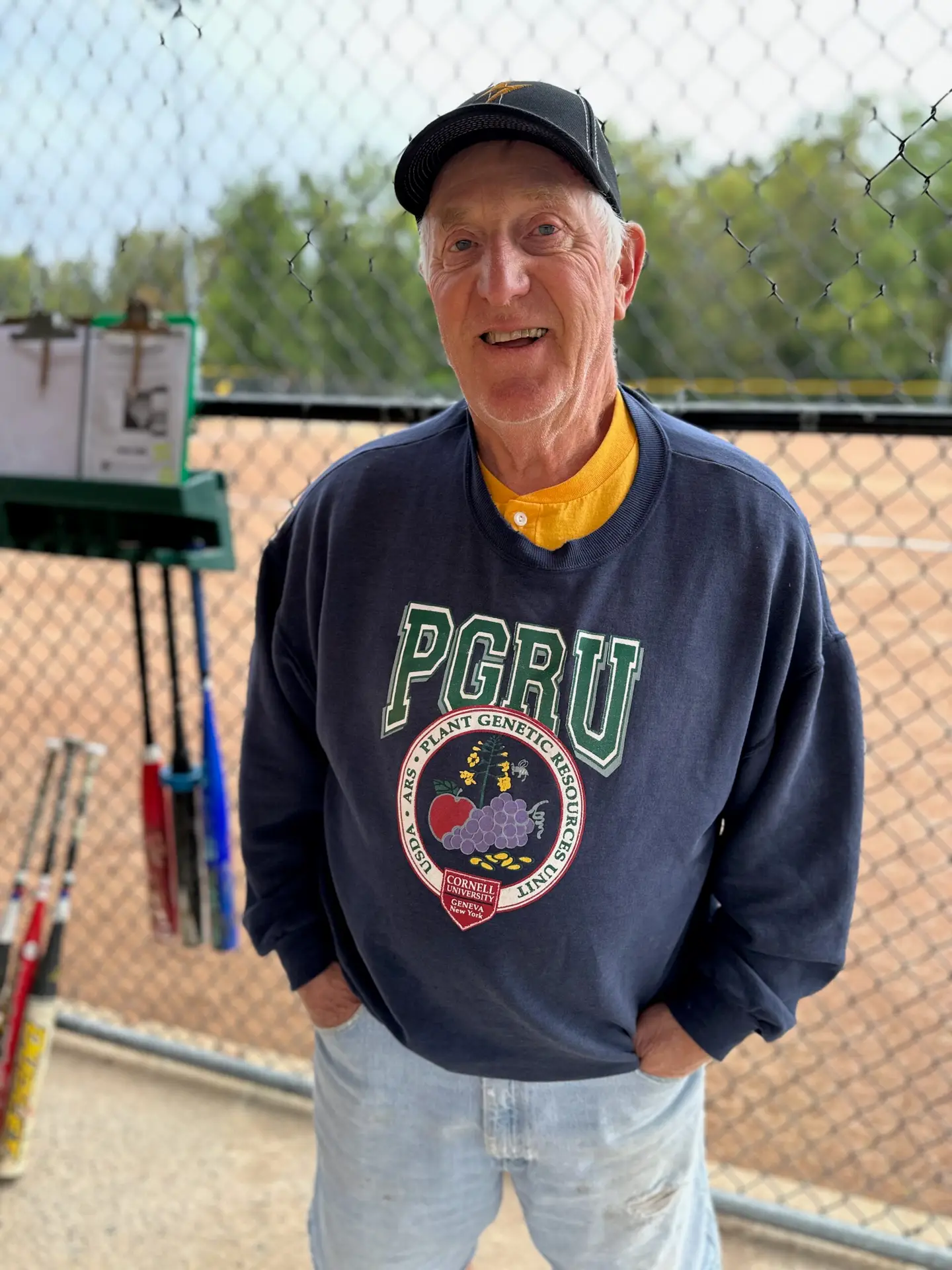
About playing at his age, Forsline says simply: “It’s just a blessing. Life is a gift.”
Jim Huber, outfield, 72
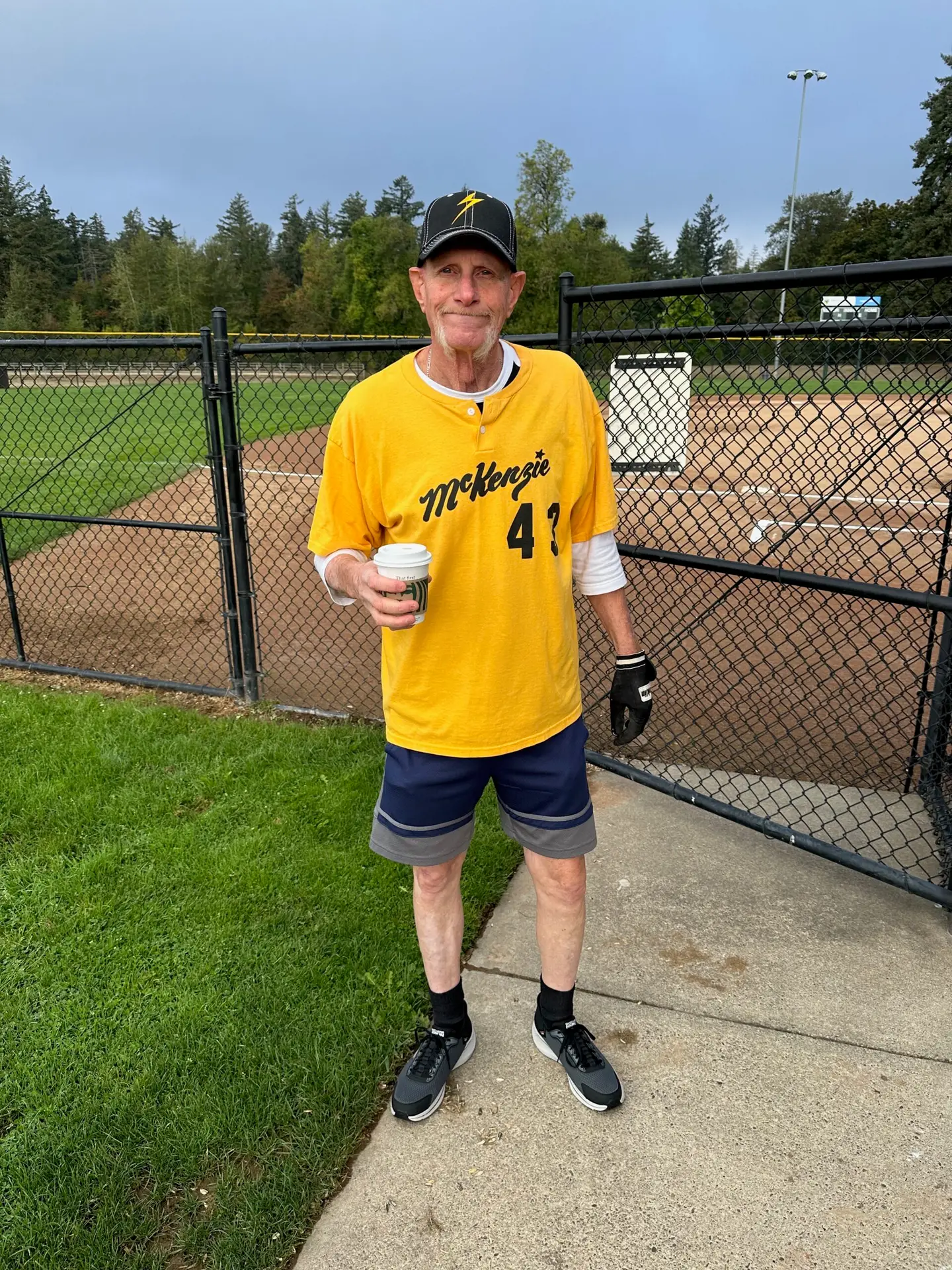
For Jim Huber, softball is about pure enjoyment. “I enjoy the smell of the gloves and everything,” he said with a grin. “It’s a passion you carry your whole life. It makes you feel good. It gives you that four hours away from the world’s problems.”
Asked how long he plans to keep playing, Huber answered without hesitation: “As long as the body holds out.”
John Tang, outfield/shortstop, 67
The youngest member of McKenzie Electric, John Tang brings both business acumen and a big bat to the roster. Owner of the KingPins family entertainment centers in Portland and Beaverton, Tang is semi-retired but stays busy. Softball has become a vital outlet.
“It started for me as a social activity,” Tang said. “But really, it’s bringing your youth back. It brings back memories from when you played baseball as a kid. Now you’re playing with seniors, and it’s like revisiting your youth again. The competitiveness, the camaraderie, being part of a team — it’s so much fun.”
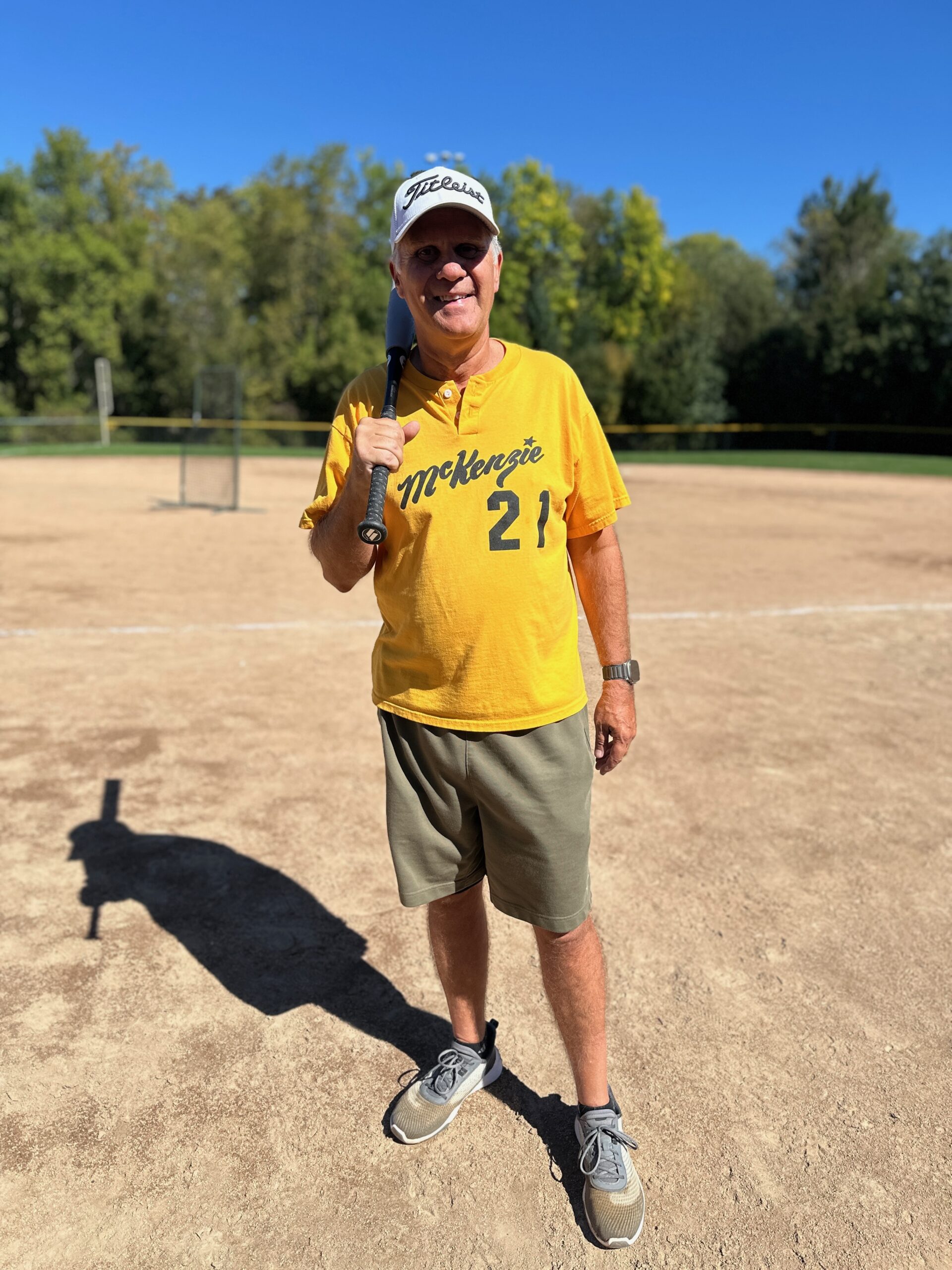
Tang is in his third year. In his second year, he hit 11 home runs and has hit several this season, too.
Tang has proved just as valuable in the field as at the plate. He has roamed both infield and outfield for McKenzie Electric, making spectacular plays. In the most recent game, he tracked down a deep fly ball at a full run — the kind of play that sparks both teammates and fans.
Charlie Howard, rover, 74
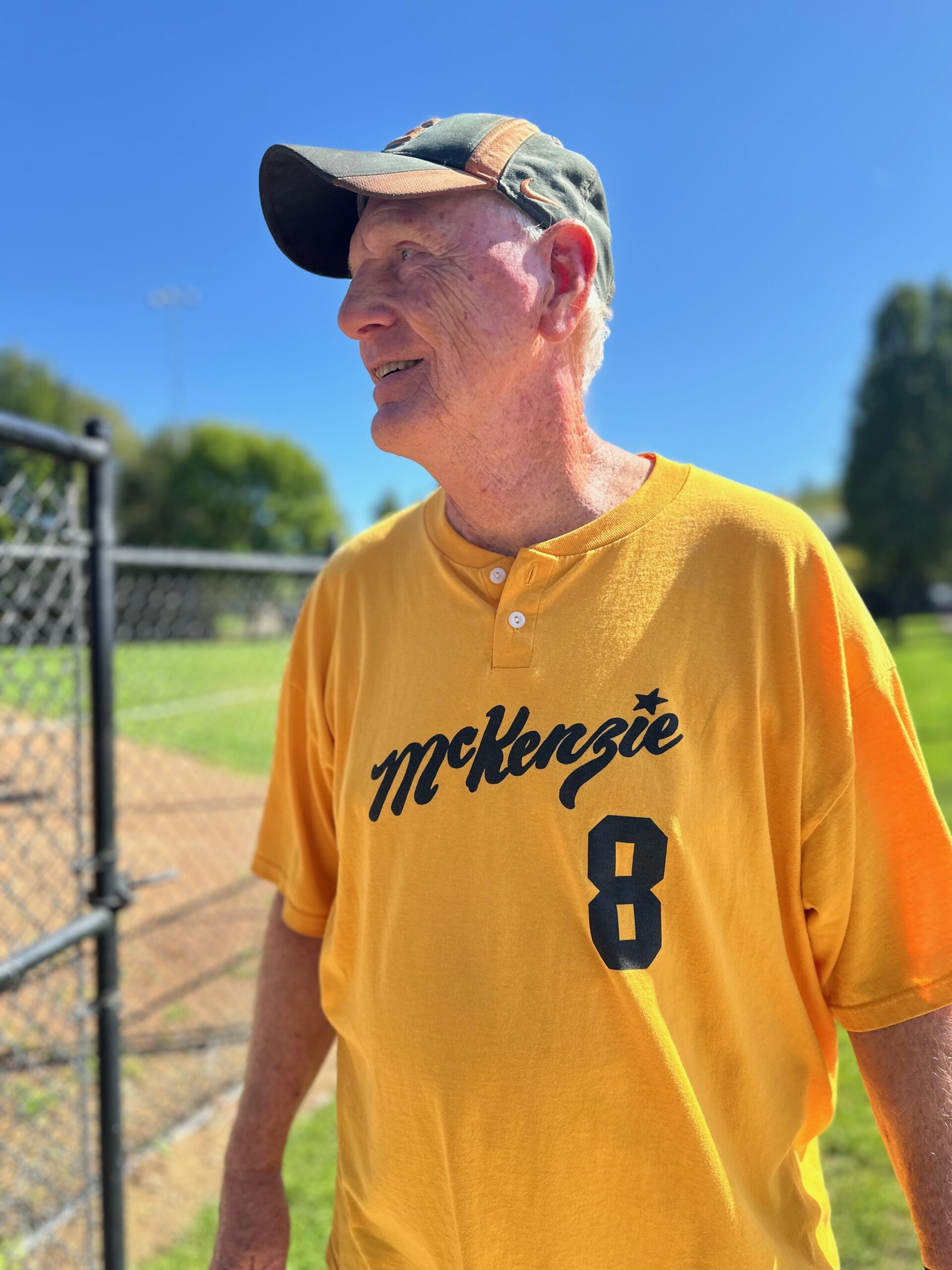
Charlie Howard is so committed to playing senior softball, he leaves Salem at 6:30am on Mondays and Wednesday to play in Clackamas. He plays on the McKenzie rec team on Mondays and manages and plays on a team in the Wednesday competitive division. Howard is tall and rangy with a friendly demeanor that keeps the bench lively. He remains a solid fielder and still hits the ball with authority, all despite two knee replacements. He is just one of many senior players who have had various “parts” upgraded and still keep playing.
Randy Wagner, pitcher, 70
Randy Wagner takes on one of the toughest jobs in the league: pitching. In PASS, pitchers not only face strong hitters but often toss both ends of a seven-inning doubleheader in the summer heat. Randy shoulders that responsibility with grit and good humor.
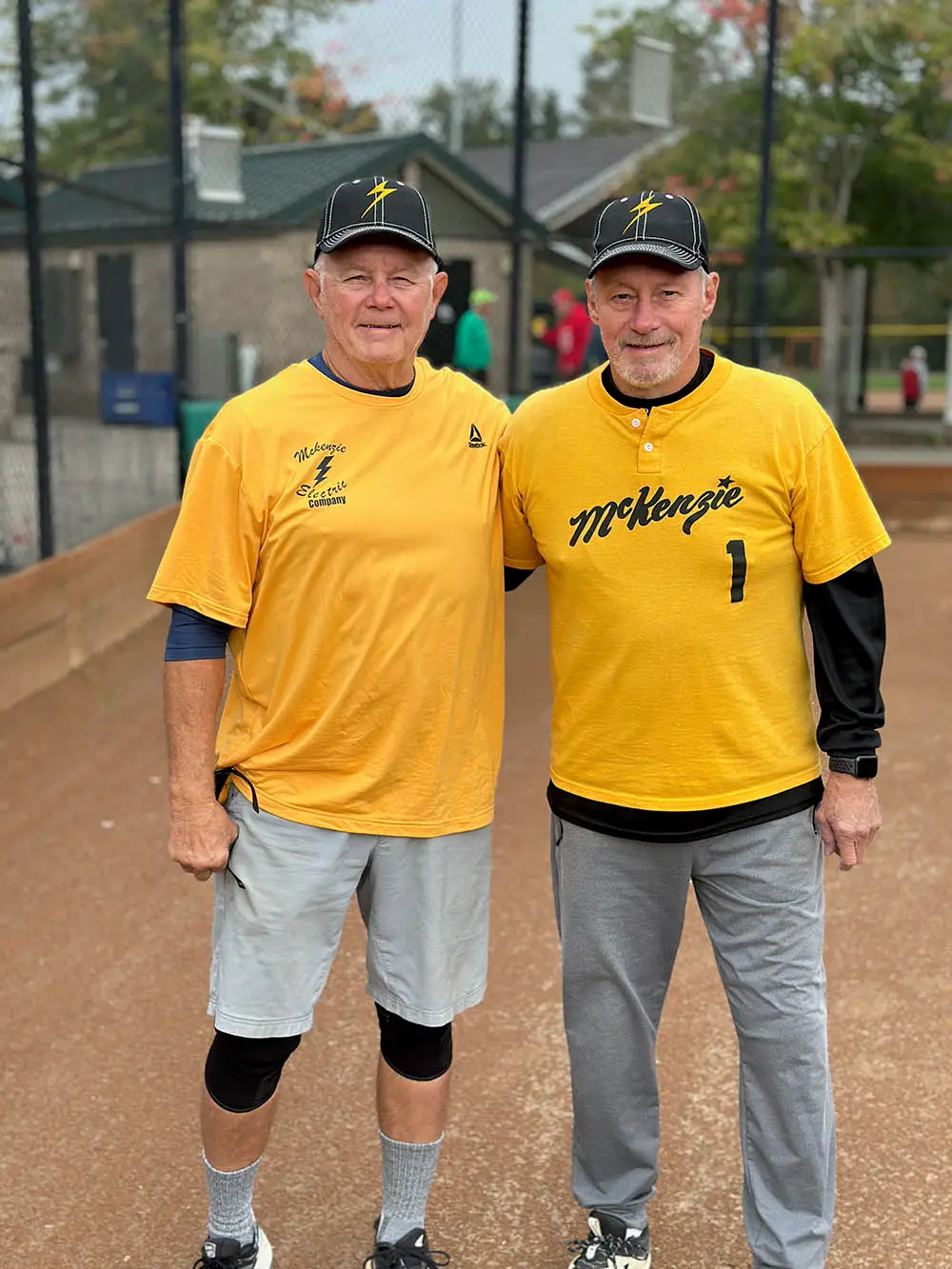
He is more than steady on the mound. In a recent game, Wagner helped his own cause with a home run. That combination of endurance and power makes him indispensable. His teammates know that when Randy is pitching, they are in reliable hands.
Steve Wagner, outfield, 74
Randy’s older brother Steve Wagner may be 74, but he plays far younger. An accomplished hitter and outfielder, Steve brings athleticism and spark to every game. His swing remains sharp, his glove reliable, and his legs still quick enough to cover ground in the outfield.
Together, the Wagner brothers are a key part of the McKenzie Electric team — Randy steady on the mound, Steve dependable in the field and at the plate.
Bobby Patraw, outfield, 74
Softball has been so central to Bobby Patraw’s life that it once influenced his marriage. Early on, he told his fiancée: “If my playing softball will be a problem for you, we can’t get married.” Apparently the answer was favorable. They have been married 40 years.
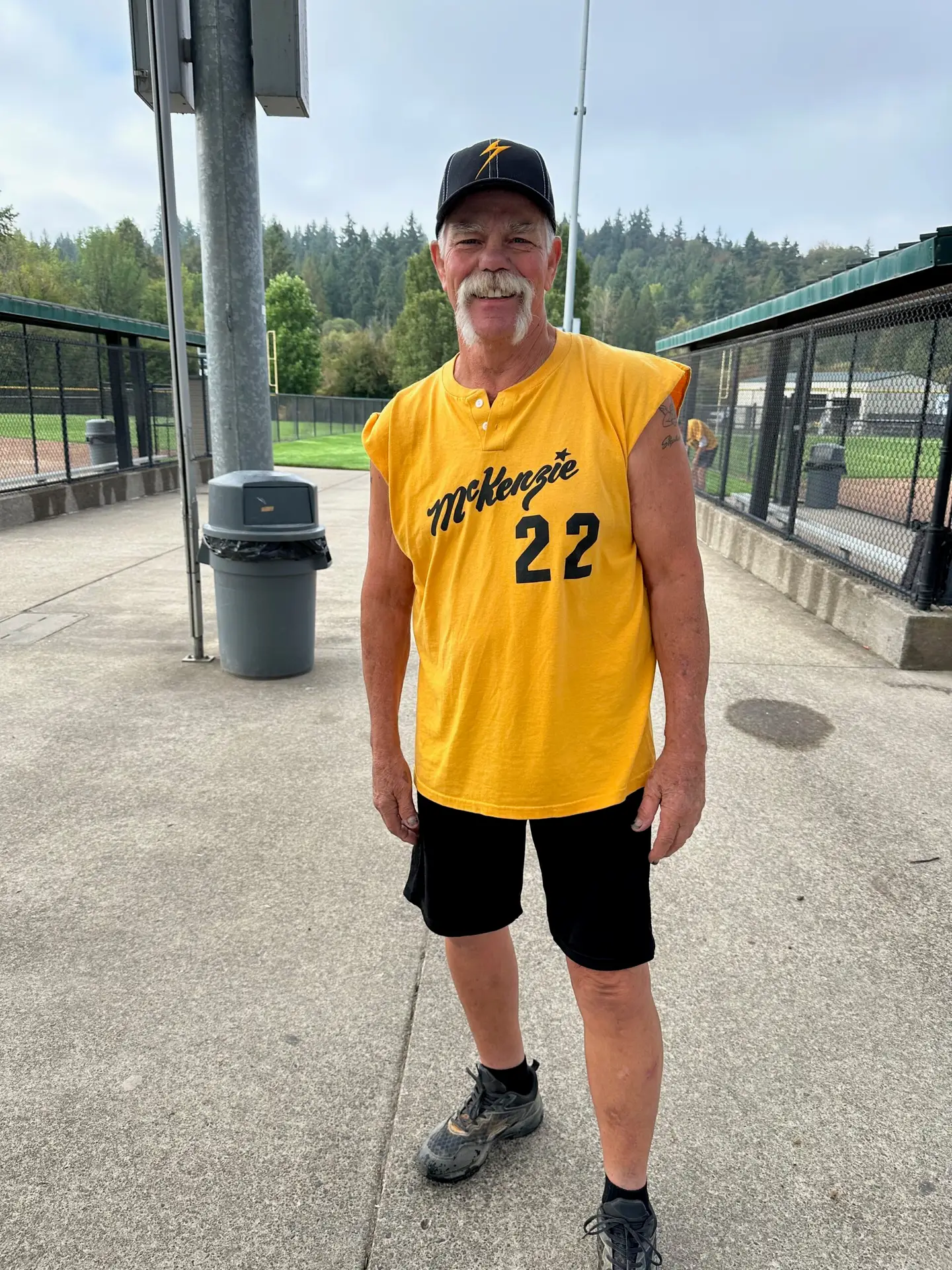
Patraw remains a strong hitter and a dependable glove in the field. He has been a tournament team player and, as well as playing on Monday’s, on Tuesday’s at Delta Park and sometimes again on Wednesday’s in the Clackamas competitive league. His love for the sport is evident in every swing and every inning he plays today.
Jerry Grover, second base/rover, 81
At 81, Jerry Grover is a living testament to the longevity senior softball makes possible. Though often quieter than some, his presence alone is an inspiration to teammates. A big fan of the 1927 Yankees, Grover still gets his hits to “the green,” the outfield grass, and still makes reliable plays in the field. His experience helps him to be at the right spot at the right time to make the play.
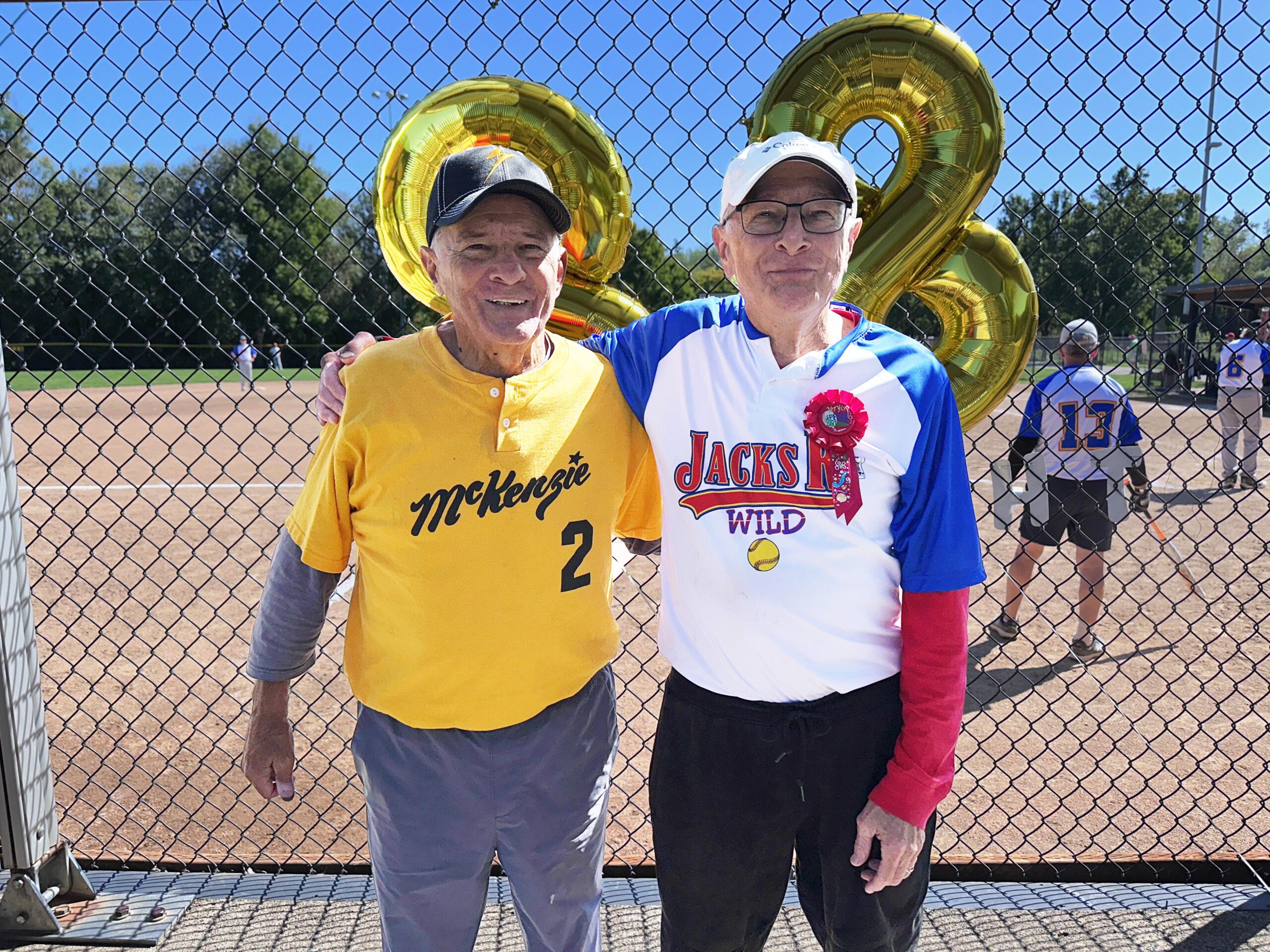
Also amazing is Grover’s older brother, Ed. Ed is still playing and contributing to another Monday team. The team just had an on-the-field celebration of Ed’s 88th birthday! The Grover brothers are an inspiration to the entire league — if the Grover brothers can still suit up and play, so can they.
Billy Kidd, rover/first base, 76
Assistant manager Billy Kidd has lived a life as remarkable as any on the roster. A Vietnam-era veteran, Kidd served aboard the aircraft carrier USS Hornet. In 1969, he was part of the ship’s crew when it recovered the Apollo 11 astronauts after their moon landing. Just months later, he was there again for Apollo 12. “I was just a small piece of what was going on,” Kidd said modestly. “But I helped make it happen.”
Kidd’s path back to softball was almost accidental. “A friend of mine that I played a lot of ball with before asked me to come out. I thought I was too old, but I showed up and there were a dozen guys I’d played with years ago. They all said, ‘Why aren’t you out here?’ That’s when I joined.”
For years, he was one of the league’s top players. “I used to love to play. A hundred and fifty games a year was about normal,” he said. “For a few years, I was tearing it up.”
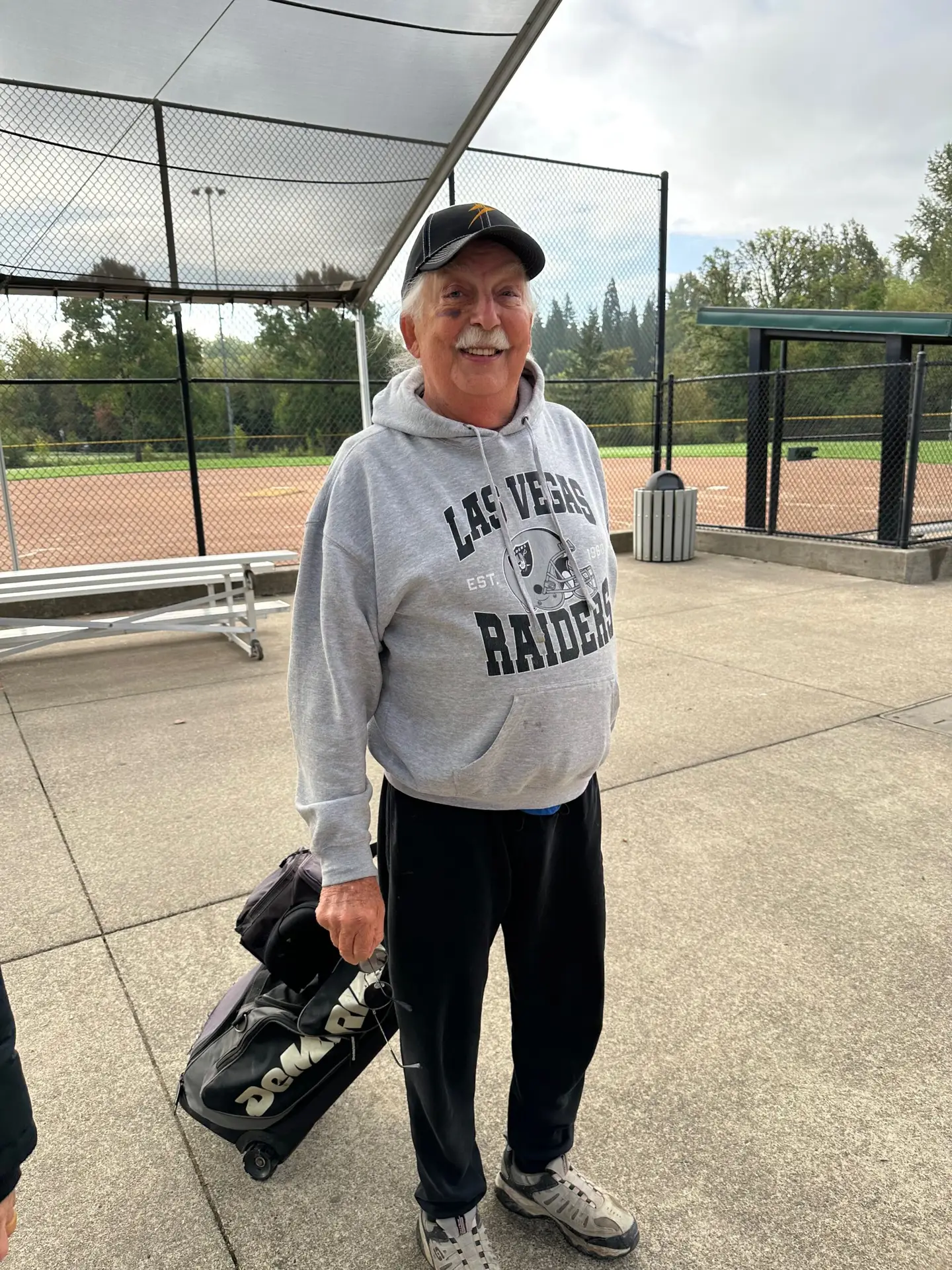
But time and health have taken a toll. Kidd has battled ankle surgery, the after effects of COVID, and ongoing cancer treatments. “I just haven’t been the same player,” he admitted. “I might be out there, but when the game is over, I don’t remember much about it. It’s disappointing, because I used to be really good at it.”
Yet Kidd remains a pillar of the team. His experience, coaching, and encouragement shape McKenzie Electric’s culture as much as any home run or diving catch. “I don’t mind coaching it, because I’m still pretty good at coaching,” he said. And his teammates know that whether he’s in the lineup or guiding from the dugout, Billy Kidd is part of what makes the team whole.
This lineup, with its range of ages and stories, is what makes McKenzie Electric special. Each player brings not only his skills but his memories, personality, and resilience. Together they form more than a roster — they form a true team.
The game still matters
Taken together, the stories of McKenzie Electric’s players form a kind of mosaic. Each man comes to the field with his own background — a postal worker, a missionary, a business owner, a Hall of Fame athlete, a lifelong runner, a Vietnam-era veteran, a grandfather — but when they step onto the diamond, those labels fall away. What remains is the sound of gloves popping, the rhythm of base paths, and the fellowship of teammates.
For some, the game is a fountain of youth. For others, it is the best kind of therapy. As Jim Huber said: “It gives you that four hours away from the world’s problems.” Still others emphasize the physical benefits. Chuck Saul said, “At my age, it’s all about movement. That’s why I play softball. It’s physical activity. I enjoy it.”
And for the oldest players, the game is nothing short of a blessing. As Phil Forsline noted, “It’s just a blessing. Life is a gift.”
Beyond all the pitches, hits, and catches is a simple truth: these players keep showing up because the game still matters. It gives structure to their weeks, goals to their practices, and personal connections to their days. As league administrator Bill Tidd put it, “All leagues exist because people love the game, and it’s only the volunteers, on a daily and yearly basis, that keep it going.”
But softball in PASS is not only about joy and nostalgia. It is also about perseverance. Assistant manager Billy Kidd spoke candidly about what it has meant to play through illness and the slowing of time. Even so, Kidd continues to show up — as a coach, as a teammate. His presence is a reminder that the game is not only for those at their peak, but also for those who simply want to keep being part of something larger than themselves.
That sense of belonging is what makes senior softball powerful. Tom Mayer, commissioner of the North Clackamas recreational division, describes it as a brotherhood.
That love is evident in every handshake, every high-five, every barbecue under the pavilion at season’s end. For McKenzie Electric and for PASS as a whole, softball is more than recreation. It is camaraderie, health, memory, and the love of the game.
All over the nation
What happens on the fields of Clackamas and Delta Park is part of something much bigger. Senior softball has quietly grown into a nationwide pastime, with leagues and tournaments stretching from Massachusetts and Florida to California, drawing tens of thousands of players in their fifties, sixties, seventies, and beyond.
At the national level, organizations like Senior Softball USA (SSUSA), the International Senior Softball Association (ISSA), and the Softball Players Association (SPA) provide structure and consistency. They set age brackets — beginning at 50 and climbing in five-year steps all the way into the 80s — and establish guidelines for everything from bat standards to safety rules. Tournaments, especially the giant “Worlds” in Las Vegas, bring together hundreds of teams, creating a spectacle that looks and feels every bit like a professional championship. Winners even walk away with rings to rival the Super Bowl’s.
Senior softball has also adapted its rules and equipment to keep the game lively for older athletes. Bats are engineered to a “hotter” standard than those used in younger leagues, giving hitters the extra pop needed to send a ball over the fence. Softballs are often a harder-flying model, designed to carry. Safety modifications — pitcher’s screens, courtesy runners, scoring lines, and no-collision rules — protect players while keeping the pace fun and competitive.
PASS fits comfortably into that landscape. Though it is not formally tied to any national body, the league follows Senior Softball USA’s general guidelines and is covered by its insurance program. “We follow the basic guidelines, but we modify the rules to fit our people and how we want to play,” explained league administrator Bill Tidd. That flexibility gives local seniors the best of both worlds: the freedom to tailor the game to their community, while still staying connected to the broader movement.
The result is a uniquely local expression of a national passion. Whether it’s a doubleheader on a Monday morning in Clackamas or a championship run in Las Vegas, the spirit is the same: men and women who still love the game, and who find in it both challenge and camaraderie.
Still boys at heart
When Roger Kahn revisited the Dodger players of 1953 in the later 1960s, he found men who had long since laid down their bats. Some had moved into business or broadcasting, others into quieter lives far from Ebbets Field. Some were happy and successful, others were mourning the loss of what was, still others never seemed to let go of the past.
Sportswriter Joe Posnanski once observed that Kahn’s “The Boys of Summer” was less about baseball than it was about trying to hold on to youth. He cited the book’s final line: “You spend a good piece of your life gripping a baseball, and in the end, it turns out that it was the other way around all the time.”
That line could just as easily describe the men of the Portland Area Senior Softball League. Each week, they step onto the diamond not only to compete, but to reclaim something timeless — the feel of the glove, the crack of a well-hit ball, the joy of running the bases, the satisfaction of snagging that line drive.
There is one ironic difference, though. When Kahn’s retired Dodgers were interviewed in the 1960s, they were still far too young to qualify to play senior softball.
Here in Portland, the senior boys — and girls — of summer are not holding on to the past. They are very much living in the present — and proving, season after season, that the game never truly lets go. They may now be seniors with the wear and tear of years, but they are still kids at heart, playing the best they can for the love of the game. HVN

